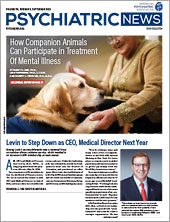When the David A. Mrazek Award for Psychiatric Pharmacogenomics was established in 2014, many researchers assumed that breakthroughs in pharmacogenomics were just around the corner. Nearly a decade later, many acknowledge that while the potential for gene testing to guide the treatment of psychiatric illness remains, there are limits to how much these tests can inform care.
“Pharmacogenomics, however, is just one corner of a bigger picture we call precision medicine,” said 2023 Mrazek Award recipient Jordan Smoller, M.D., Sc.D., during his lecture at APA’s Annual Meeting in May. Smoller is the MGH Trustees Endowed Chair in Psychiatric Neuroscience and a professor of psychiatry at Harvard Medical School.
The Mrazek Award honors the legacy of Mayo Clinic researcher and pharmacogenomics pioneer David Mrazek, M.D., and is meant to carry on his translational work. Smoller was recognized for his longstanding work combining genetic, environmental, and brain imaging data to inform psychiatrists’ understanding of mental illness across the lifespan.
One area of interest by his group has been the analysis of polygenic risk scores, which combine all the potentially risky genetic variants a person has into a discrete estimation of their risk for a certain disease. While polygenic risk scores are not yet ready for the clinic, mining genetic risk data has led to useful discoveries, Smoller said.
His team, for example, analyzed a large genetic biobank spanning four health care systems and found a strong association between a person’s polygenic risk score for depression and elevated white blood cell count. Such evidence supports the role of the immune system in depression, and also suggests that in the future, routine blood tests may be able to provide clues about depression.
Another data mining study from Smoller’s lab—this one
published in
The American Journal of Psychiatry—used extensive biobank data to uncover modifiable risk factors (such as environment and lifestyle) that might help prevent the onset of depression. His findings revealed that a strong social network, primarily being able to confide in others, is one of the strongest ways to prevent depression, even in people with high genetic risk.
Smoller also discussed a machine learning program he helped develop that stratifies people into suicide risk categories based on patient health data and a short patient survey given.
“There is multiple evidence that a majority of people who die by suicide see a doctor in the month preceding death; this is an opportunity to intervene,” he said. He has integrated his program into the electronic health record (EHR) system at Harvard so it can offer real-time risk prediction.
Smoller thinks pharmacogenomics could also be incorporated into such big data projects. For example, he described how his lab is using artificial intelligence (AI) to analyze both structured (prescription history) and unstructured (narrative notes) EHR language to predict patients’ antidepressant response. The model is good enough to predict which class of antidepressant (for example, selective serotonin reuptake inhibitor or serotonin and norepinephrine reuptake inhibitors) to which a patient will respond in about 74% of cases. Additional data such as a patient’s drug metabolism profile (obtained via pharmacogenetic tests) might increase prediction accuracy.
And given how genetic testing continues to get less expensive, it may not be long before such data are a routine component of many patients’ medical records, Smoller said. ■

